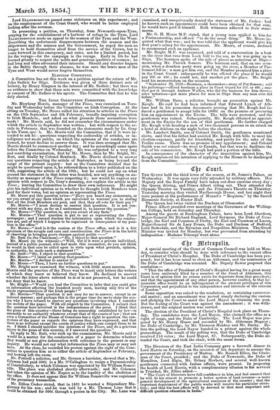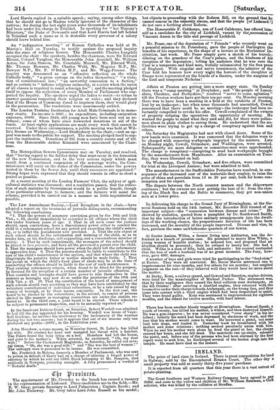airtruptio.
A special meeting of the Court of Common Council was held on Mon- day, to consider what should be done with reference to the vacant office of President of Christ's Hospital. The Duke of Cambridge has been pro- posed; but it has been usual to elect an Alderman, and the nomination of the Duke of Cambridge was resented. Mr. Deputy Bower proposed this resolution-
" That the office of President of Christ's Hospital having for a great many years been uniformly filled by a member of the Court of Aldermen, this Court is of opinion that no reason exists for departure from that precedent; and that the appointment of any other person, however exalted, to that ho. nourable office would be an infringement of the ancient privileges of this Corporation and prejudicial to the independence and interests of the citizens of London."
Some opposition was raised to the resolution, as containing controver- sial matter ; and an amendment was moved simply declaring the custom and pledging the Court to assist the Lord Mayor in obtaining the post. But the feeling of the Court was against the amendment ; it was with- drawn, and the original motion was carried.
The election of the President of Christ's Hospital took place on Thurs- day. The candidates were the Lord Mayor, who claimed the office as a right of usage, and the Duke of Cambridge. The Lord Mayor was pro- posed by Mr. Henry Hoare and seconded by Mr. Alderman Magnay ; the Duke of Cambridge, by Mr. Thomson Hankey and Mr. Darby. Be- fore the polling, the Lord Mayor handed in a protest against the whole proceedings. The result of the polling was, that the Duke of Cambridge received 216 votes ; the Lord Mayor, 87. Subsequently, the Duke at- tended the Court, and took the chair, with the usual forma.
The Directors of the East India Company gave a farewell dinner to Lord Harris on Saturday, on the occasion of his departure to assume the government of the Presidency of Madras. Mr. Russell Ellice, the Chair- man of the Court, presided ; and the Duke of Newcastle, the Duke of Hamilton, Lord Elgin, Mr. Sidney Herbert, and several well-known gentlemen connected with Indian affairs, were present. In proposing the health of Lord Harris, with a complimentary allusion to his services in Trinidad, Mr. Ellice added- " The Court of Directors have full confidence in him, and feel assured that he will do his utmost to promote a better system of land revenue—a more general development of the agricultural resources of the country ; that the important department of the public works will receive his particular atten- tion; and that his best efforts will be devoted to that most important and difficult question education in India."
Lord Harris replied in a suitable speech; saying, among other things, that he should not go to Madras totally ignorant of the character of the natives ; for during the last eight years some thousands of its inhabitants had been under his charge in Trinidad. In speaking for "her Majesty's Ministers," the Duke of Newcastle said that Lord Harris had left behind in Trinidad such a name as it is desirable every governor of a colony should leave behind him.
An "indignation meeting" of Roman Catholics was held at St. Martin's Hall on Tuesday, to testify against the proposed inquiry into the state of religious houses. The Honourable Charles Langdale occupied the chair : the speakers, besides the chairman, were Sir Edward Blount, Colonel Vaughan, the Honourable John Arundell, Mr. William Acton, Sir John Simeon, Mr. Constable Maxwell, Mr. Edward Weld, Mr. Thomas Henure,s, Mr. Charles Weld, Mr. Maguire Mr. Bowyer M.P., Mr. P. O'Brien M.P., and Mr. Wegg-Prosser. The inquiry was denounced as an "offensive reflection on the whole Catholic body," "a gross outrage on the ladies themselves," "a viola- tion of constitutional law," "an unworthy concession to a faction," and as certain to "inflame religious animosity, at a crisis when the union of all classes is required to resist a foreign foe" ; and the meeting pledged itself to oppose the reelection of every Member of Parliament who sup- ported the inquiry. The speakers urged the ladies to resist—to refuse to answer questions respecting their religion or rules ; and they declared that if the House of Commons dared to imprison them, they would glory in the persecution. The resolutions were unanimously carried.
The London Training Institution for Adult Male Criminals is in mone- tary straits. Its income is 6001.; its expenditure, including emigration expenses, 30001. Since 1848, 402 young men have been sent out as re- formed ; some of whom have since forwarded donations in aid of the funds. At least eighty applications are made every week that cannot be received. Under these circumstances, a public meeting was held at Wil- lis's Rooms on Wednesday,—Lord Shaftesbury in the chair,—and an ap- peal was made to the public for support. The meeting pledged itself to sup- port the institution. Donations of 201. from a country curate and of 101. from the Honourable Arthur Kinnaird were announced by the Chair- man.
The Metropolitan Sewers Csanmission met on Tuesday, and resolved, that "having regard to the farther delay that must occur in the formation of the new Commission, and to the very serious injury which must result from a continued suspension of the sewerage works, the Com- missioners will carry on the duties of the Commission, under the powers vested in them by the Sewer Act, until their successors are appointed." Biasing hopes were expressed that they should remain in office as short a period as possible.
At a recent meeting of the London Farmers' Club, the subject of agri- cultural statistics was discussed; and a resolution passed, that the collec- tion of such statissies by Government would be a public benefit, though of no particular advantage to farmers; and the farmers will assist the scheme, provided it be carried out in a manner as little inquisitorial as possible.
The Law Amendment Society,—Lord Brougham in the ehair,—have adopted a report on the treatment of juvenile delinquents, recommending the following conclusions.
"1. That the powers of summary conviction given by the 10th and 11th Viet, c. 82, should immediately be extended to all offences where the child was under fourteen years of age. 2. That in all such cases the justices should, upon convictions, have a discretionary power either to commit the child to a reformatory school for any period not exceeding the child's minor- ity, or to inflict the punishment now provided. 3. That the sole object of such school should be the reformation and training of the child, so as to render him, on his discharge, self-supporting, and a conscientious member of society. 4. That by such commitment, the managers of the school should be placed in loco parentis, and have all the powers of a parent over the child. 6. That the managers should have power when the child left the reformatory to apprentice him. 6. That the parents should be liable to contribute to the coat of the child's maintenance in the asylum, and that where the child was illegitimate the putative father or mother should be made liable. 7. That the parish in which the child's fixed place of abode may be at the time of committing the offence should be liable to the cost of such maintenance. 8. That existing reformatory schools, when found to be fitted for the purpose, be licensed for the reception of a certain number of juvenile offenders. 9. That counties and boroughs should have power to rate themselves in like manner as boroughs may now do so under the provisions of the 10th and ' 11th Vict. c. 43. 10. That the constitution of the board of management of such schools should vary according as they may have been established by the voluntary contributions of individual subscribers, or by a rate raised by any county or borough, or by these means conjointly. In the first case, the ' board to be elected by the subscribers ; in the second, to consist of persons elected in like manner as managing committees are under the statute re- 1 ferred to. In the third case, a joint board to be elected. These schools to I be subject to permanent inspection, and to be annually reported on."
In the Insolvent Debtors Court, on Saturday, Robert Wardell was admitted to bail till the day appointed for his hearing. Wardell was lessee of Vaux- hall Gardens; he ascribes his insolvency to the inclemency of the weather during the last two seasons ; but it appears that out of six seasons only one produced any profits-2000/., in the Exhibition year.
John Renshaw, a stone-mason, in Waterloo Street, St. Luke's, has killed his wife. He crushed her head and mangled her throat with a hatchet. The Polite found the body lying on a bed. Henshaw had left the house, and gone to his mother's. When arrested, he exclaimed, "Oh, my dear wife!" Before the Clerkenwell Magistrate, on Saturday, he called out seve- ral times, "Oh, she was a good wife ! " and "She was the best of women !" the unhappy man is presumed to be insane. Re was committed. Mr. Frederick de Molyns, formerly a Member of Parliament, who was sent to prison in default of heavy bail on a charge of uttering a forged power of attorney by which he sold out 15001. Stock belonging to Mr. Simpson, died suddenly in Newgate, yesterday sennight. A Jury pronounced a verdict of "Natural death."



































 Previous page
Previous page